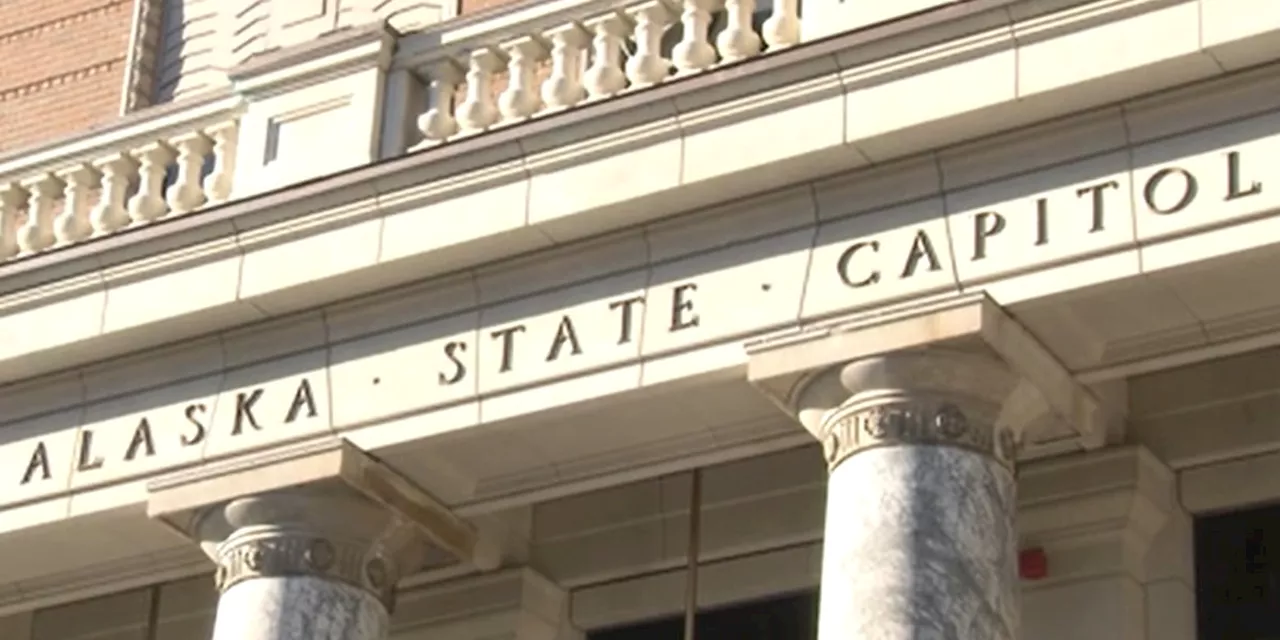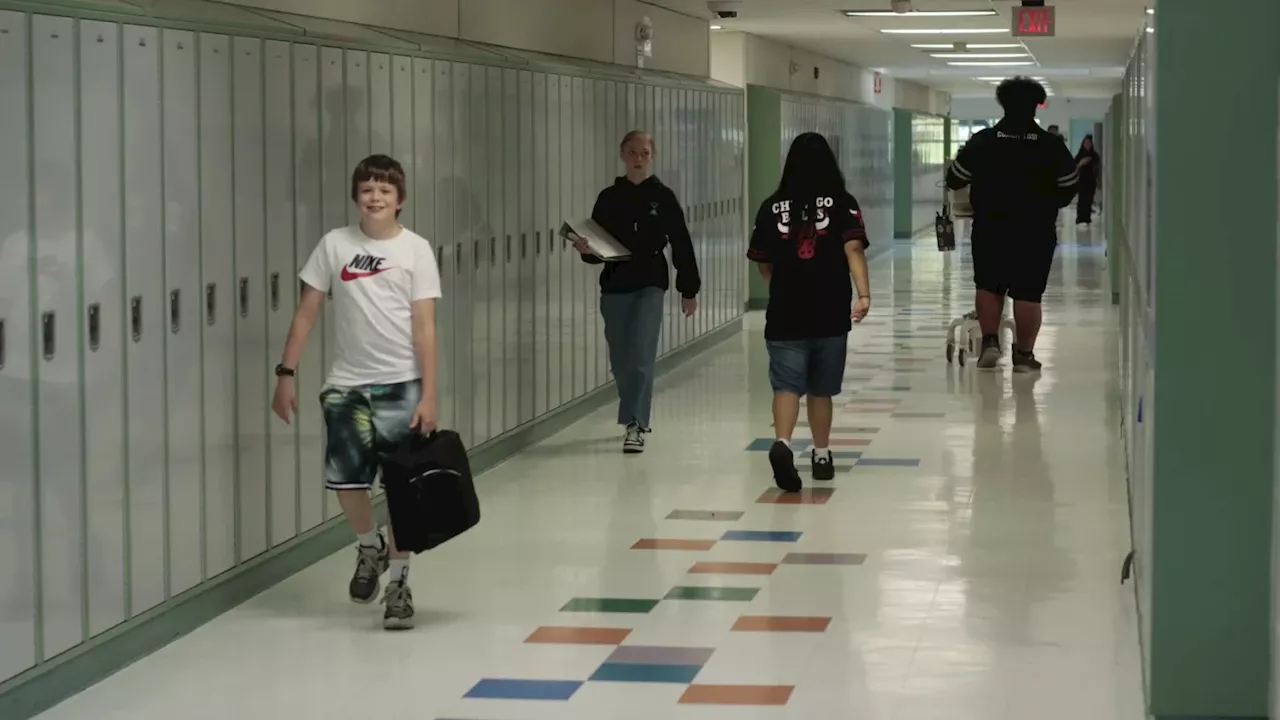The Alaska State Board of Education is exploring a new policy that would allow, but not require, school districts to restrict student cell phone usage in classrooms. The proposed policy aims to strike a balance between providing guidance and respecting local autonomy, empowering districts to tailor regulations to their specific needs. The board's draft policy encourages districts to consider broader restrictions, such as prohibiting cell phone use during lunch periods, based on anecdotal evidence from schools with existing policies that report increased student interaction and engagement.
Students navigate the corridors of Wendler Middle School during a passing period on Friday, September 6, 2024. The school enforces a policy prohibiting cell phone usage during class. The Alaska State Board of Education is considering a new policy that would allow, but not mandate, school districts to restrict student cell phone use in classrooms.
The draft policy, presented during their Wednesday meeting, acknowledges the need for flexibility and empowers individual districts to tailor specific regulations. While the board encourages districts to adopt these restrictions, they emphasize that the decision ultimately rests with local authorities. The board's proposed policy offers exemptions for medical reasons and educational purposes. It also encourages districts to consider broader restrictions, such as prohibiting cell phone use during lunchtime, citing anecdotal evidence from schools with existing policies that report increased student interaction and engagement during meal breaks. Commissioner Deena Bishop, Alaska's Education Commissioner, underscored the importance of district autonomy in shaping these policies. She emphasized that while the state board provides guidelines, districts retain the authority to determine the specific details that best suit their communities. This draft policy diverges from a proposed state Senate Bill (SB) from Sen. Bill Wielechowski, D-Anchorage, which would mandate schools to implement their own cell phone restrictions or adopt the state board's version. The Senate bill also proposes a ban on cell phone use during lunch periods, aligning with the board's recommendation based on reports of improved social interaction in schools with existing restrictions. Commissioner Bishop, who has gathered feedback from schools implementing these policies, shared an anecdote highlighting the positive impact. She recounted a school visit where she observed a lively cafeteria filled with students engaging in conversations, a stark contrast to the quiet, individual phone-focused atmosphere she had witnessed previously. Commissioner Bishop expressed concern that without state-level guidance, schools would lack a framework for managing cell phone usage, likening it to leaving a liquor cabinet unlocked without any regulations. She emphasized the need for a policy that promotes responsible cell phone use while safeguarding the educational environment and fostering student interaction
Cell Phones School Policy Student Engagement Alaska Education Board Lunch Periods
United States Latest News, United States Headlines
Similar News:You can also read news stories similar to this one that we have collected from other news sources.
 Alaska College Hockey Teams Head to Tournaments in Lower 48Alaska Anchorage and Alaska Fairbanks will compete in tournaments this weekend.
Alaska College Hockey Teams Head to Tournaments in Lower 48Alaska Anchorage and Alaska Fairbanks will compete in tournaments this weekend.
Read more »
 Alaska Gasline Development Corp. in Secret Talks for Trans-Alaska PipelineThe Alaska Gasline Development Corp., a state-owned entity, announced it has entered into exclusive negotiations with an undisclosed energy company to lead and finance the development of a trans-Alaska natural gas pipeline. The project, estimated to cost at least $44 billion, has been a long-standing goal with significant cost as a major obstacle. The agreement includes plans for an export facility, indicating the project is for the larger, previously discussed pipeline.
Alaska Gasline Development Corp. in Secret Talks for Trans-Alaska PipelineThe Alaska Gasline Development Corp., a state-owned entity, announced it has entered into exclusive negotiations with an undisclosed energy company to lead and finance the development of a trans-Alaska natural gas pipeline. The project, estimated to cost at least $44 billion, has been a long-standing goal with significant cost as a major obstacle. The agreement includes plans for an export facility, indicating the project is for the larger, previously discussed pipeline.
Read more »
 ANILCA: Carter's Legacy in Alaska | Talk of AlaskaWe discuss President Carter's legacy of conservation, and the Alaska National Interest Lands Conservation Act on this Talk of Alaska.
ANILCA: Carter's Legacy in Alaska | Talk of AlaskaWe discuss President Carter's legacy of conservation, and the Alaska National Interest Lands Conservation Act on this Talk of Alaska.
Read more »
 Alaska Shoppers Willing to Pay More for 'Alaska Grown' ProduceA new study reveals that Alaska grocery shoppers are willing to pay a premium for locally grown produce, especially when informed about its benefits to health, the environment, and the state economy. The research, conducted by the University of Maine, found that consumers were willing to pay an average of $1.90 extra for a head of lettuce labeled as 'Alaska Grown'. This premium increased to $3.31 when given additional information about the benefits of locally grown food.
Alaska Shoppers Willing to Pay More for 'Alaska Grown' ProduceA new study reveals that Alaska grocery shoppers are willing to pay a premium for locally grown produce, especially when informed about its benefits to health, the environment, and the state economy. The research, conducted by the University of Maine, found that consumers were willing to pay an average of $1.90 extra for a head of lettuce labeled as 'Alaska Grown'. This premium increased to $3.31 when given additional information about the benefits of locally grown food.
Read more »
 Alaska Teacher Celebrated for 50 Years of EducationCarolyn Workman, a teacher at Innoko River School in Shageluk, Alaska, was honored for her 50 years of service to education. She has taught over 1500 students, including her own family members, and has held various roles within the school.
Alaska Teacher Celebrated for 50 Years of EducationCarolyn Workman, a teacher at Innoko River School in Shageluk, Alaska, was honored for her 50 years of service to education. She has taught over 1500 students, including her own family members, and has held various roles within the school.
Read more »
 Alaska Lawmakers Convene for 34th Legislature, Prioritizing Education, Energy, and EconomyAs the 34th Legislature commenced in Anchorage, Alaska, lawmakers focused on key priorities including education, energy, and the economy. Lt. Gov. Nancy Dahlstrom emphasized the importance of collaboration and respectful discourse among lawmakers. Senate President Gary Stevens highlighted the responsibility of representing all Alaskans and the need to work together despite differing viewpoints. Both the House and Senate majority and minority caucuses outlined their legislative goals, emphasizing the need for a balanced budget, addressing the natural gas shortage, and ensuring affordability for Alaskans.
Alaska Lawmakers Convene for 34th Legislature, Prioritizing Education, Energy, and EconomyAs the 34th Legislature commenced in Anchorage, Alaska, lawmakers focused on key priorities including education, energy, and the economy. Lt. Gov. Nancy Dahlstrom emphasized the importance of collaboration and respectful discourse among lawmakers. Senate President Gary Stevens highlighted the responsibility of representing all Alaskans and the need to work together despite differing viewpoints. Both the House and Senate majority and minority caucuses outlined their legislative goals, emphasizing the need for a balanced budget, addressing the natural gas shortage, and ensuring affordability for Alaskans.
Read more »
